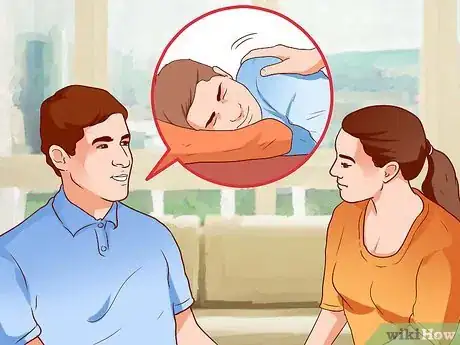This article was co-authored by Alex Dimitriu, MD. Alex Dimitriu, MD is the Owner of Menlo Park Psychiatry and Sleep Medicine, a clinic based in the San Francisco Bay Area with expertise in psychiatry, sleep, and transformational therapy. Alex earned his Doctor of Medicine from Stony Brook University in 2005 and graduated from the Stanford University School of Medicine's Sleep Medicine Residency Program in 2010. Professionally, Alex has dual board certification in psychiatry and sleep medicine.
There are 14 references cited in this article, which can be found at the bottom of the page.
This article has been viewed 354,531 times.
After a long day, you're ready to roll onto your stomach and catch some zzzs. Unfortunately, this sleeping position is hard on your body and is a common cause of low back pain, neck pain, shoulder issues, and headaches.[1] There's no need to worry, though. You can switch your sleeping position if you put your mind to it, and we're here to show you how. Keep scrolling for an in-depth look at what stomach sleeping does to your body—and more importantly, how you can make a change.
Steps
Expert Q&A
Did you know you can get expert answers for this article?
Unlock expert answers by supporting wikiHow
-
QuestionWhat is the healthiest sleeping position?
 Alex Dimitriu, MDAlex Dimitriu, MD is the Owner of Menlo Park Psychiatry and Sleep Medicine, a clinic based in the San Francisco Bay Area with expertise in psychiatry, sleep, and transformational therapy. Alex earned his Doctor of Medicine from Stony Brook University in 2005 and graduated from the Stanford University School of Medicine's Sleep Medicine Residency Program in 2010. Professionally, Alex has dual board certification in psychiatry and sleep medicine.
Alex Dimitriu, MDAlex Dimitriu, MD is the Owner of Menlo Park Psychiatry and Sleep Medicine, a clinic based in the San Francisco Bay Area with expertise in psychiatry, sleep, and transformational therapy. Alex earned his Doctor of Medicine from Stony Brook University in 2005 and graduated from the Stanford University School of Medicine's Sleep Medicine Residency Program in 2010. Professionally, Alex has dual board certification in psychiatry and sleep medicine.
Sleep Medicine & Psychiatry Professional
-
QuestionI sleep on my stomach and I have a sore ribs all the way up to my sternum, only on my left side. What should I do?
 Chris M. Matsko, MDDr. Chris M. Matsko is a retired physician based in Pittsburgh, Pennsylvania. With over 25 years of medical research experience, Dr. Matsko was awarded the Pittsburgh Cornell University Leadership Award for Excellence. He holds a BS in Nutritional Science from Cornell University and an MD from the Temple University School of Medicine in 2007. Dr. Matsko earned a Research Writing Certification from the American Medical Writers Association (AMWA) in 2016 and a Medical Writing & Editing Certification from the University of Chicago in 2017.
Chris M. Matsko, MDDr. Chris M. Matsko is a retired physician based in Pittsburgh, Pennsylvania. With over 25 years of medical research experience, Dr. Matsko was awarded the Pittsburgh Cornell University Leadership Award for Excellence. He holds a BS in Nutritional Science from Cornell University and an MD from the Temple University School of Medicine in 2007. Dr. Matsko earned a Research Writing Certification from the American Medical Writers Association (AMWA) in 2016 and a Medical Writing & Editing Certification from the University of Chicago in 2017.
Family Medicine Physician
-
QuestionI snore, but I can't tell if it's from breathing with my mouth open, or just from sleeping on my stomach. I am also not sure if I have sleep apnea. What should I do?
 Chris M. Matsko, MDDr. Chris M. Matsko is a retired physician based in Pittsburgh, Pennsylvania. With over 25 years of medical research experience, Dr. Matsko was awarded the Pittsburgh Cornell University Leadership Award for Excellence. He holds a BS in Nutritional Science from Cornell University and an MD from the Temple University School of Medicine in 2007. Dr. Matsko earned a Research Writing Certification from the American Medical Writers Association (AMWA) in 2016 and a Medical Writing & Editing Certification from the University of Chicago in 2017.
Chris M. Matsko, MDDr. Chris M. Matsko is a retired physician based in Pittsburgh, Pennsylvania. With over 25 years of medical research experience, Dr. Matsko was awarded the Pittsburgh Cornell University Leadership Award for Excellence. He holds a BS in Nutritional Science from Cornell University and an MD from the Temple University School of Medicine in 2007. Dr. Matsko earned a Research Writing Certification from the American Medical Writers Association (AMWA) in 2016 and a Medical Writing & Editing Certification from the University of Chicago in 2017.
Family Medicine Physician In order to determine if you have sleep apnea, you need to have a sleep study. This is when you go into the hospital or a special clinic and they monitor you sleep including brain wave, breathing, and quality of sleep. This will determine if you have a sleep pathology that needs treatment. Treatment for sleep apnea includes CPAP machines and dental mouth guards.
In order to determine if you have sleep apnea, you need to have a sleep study. This is when you go into the hospital or a special clinic and they monitor you sleep including brain wave, breathing, and quality of sleep. This will determine if you have a sleep pathology that needs treatment. Treatment for sleep apnea includes CPAP machines and dental mouth guards.
References
- ↑ http://www.mayoclinic.org/diseases-conditions/back-pain/multimedia/sleeping-positions/sls-20076452?s=3
- ↑ https://health.clevelandclinic.org/back-side-stomach-sleep-position-best/
- ↑ https://kidshealth.org/en/parents/sids.html
- ↑ https://www.sleepfoundation.org/sleeping-positions
- ↑ http://www.huffingtonpost.com/ronald-alexander-phd/positive-affirmations_b_921184.html
- ↑ Alex Dimitriu, MD. Sleep Medicine & Psychiatry Professional. Expert Interview. 16 October 2019.
- ↑ http://www.spine-health.com/wellness/sleep/different-types-pillows
- ↑ https://www.sleepfoundation.org/sleep-hypnosis
- ↑ https://www.sleepfoundation.org/sleeping-positions
- ↑ https://www.onhealth.com/content/1/best_sleeping_positions_sleep
- ↑ https://www.spine-health.com/wellness/sleep/pillows-different-sleeping-positions
- ↑ https://www.urmc.rochester.edu/encyclopedia/content.aspx?ContentTypeID=1&ContentID=4460
- ↑ https://health.clevelandclinic.org/back-side-stomach-sleep-position-best/
- ↑ https://www.urmc.rochester.edu/encyclopedia/content.aspx?ContentTypeID=1&ContentID=4460
- ↑ https://health.ucsd.edu/news/features/Pages/2019-09-09-listicle-taking-a-position-on-sleep.aspx
- ↑ https://www.hopkinsmedicine.org/health/wellness-and-prevention/choosing-the-best-sleep-position
- ↑ https://www.sleepfoundation.org/sleeping-positions/fetal
- ↑ Alex Dimitriu, MD. Sleep Medicine & Psychiatry Professional. Expert Interview. 16 October 2019.
About This Article
To stop sleeping on your stomach, try sleeping on your side with a pillow that fits between the tip of your shoulder and the side of your head to fully support your neck. Additionally, place a pillow between your knees to avoid any hip pain. Alternatively, try sleeping on your back by using an orthopedic pillow to cradle your neck. You can also use a rolled up towel under your knees or lower back to avoid any stiffness. For more tips from our Medical co-author, including how to use hypnotherapy to stop sleeping on your stomach, keep reading!





































































Medical Disclaimer
The content of this article is not intended to be a substitute for professional medical advice, examination, diagnosis, or treatment. You should always contact your doctor or other qualified healthcare professional before starting, changing, or stopping any kind of health treatment.
Read More...